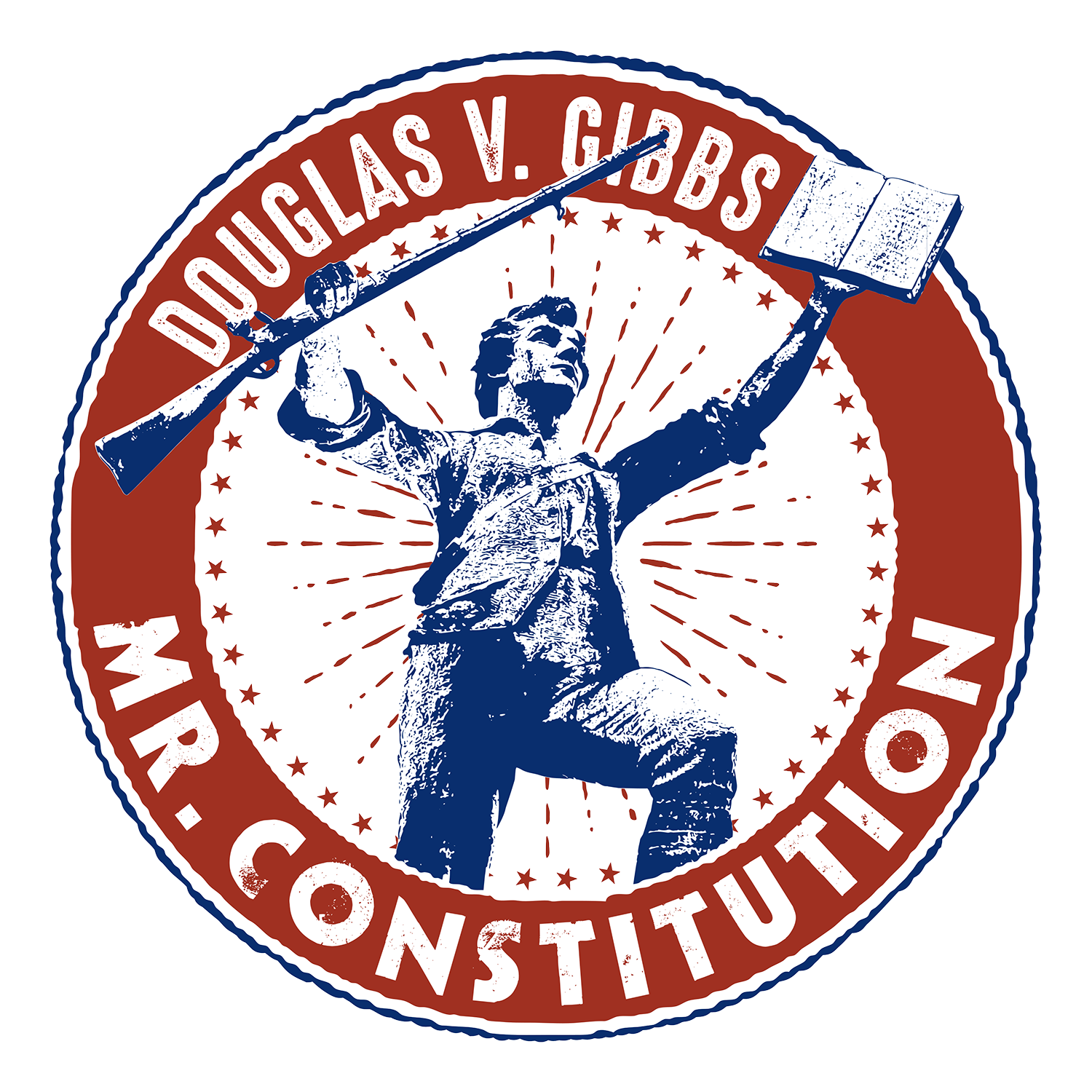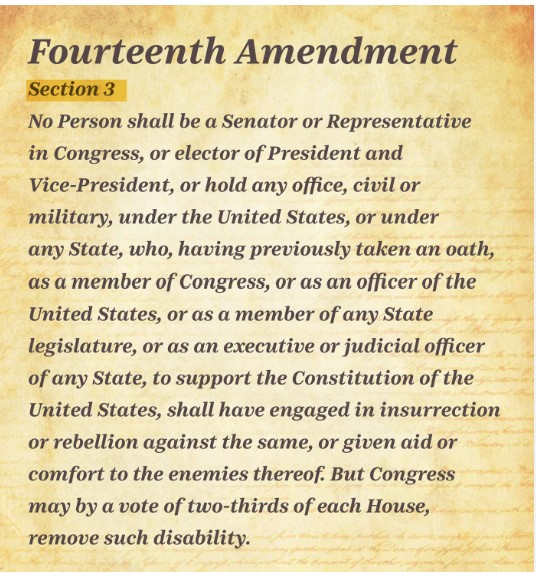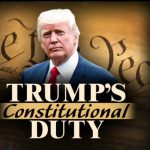By Douglas V. Gibbs
Author, Speaker, Instructor, Radio Host
The Democrats are desperate to keep Trump as far away from politics as possible. His election in 2016 put a monkey wrench in their sixteen year plan to move America into a one-party system. Trump’s policies ran opposite of their policies, and his administration threatened to reveal how evil their criminal political enterprise really is. Their propaganda, their false Russia-Gate fabrication, their multiple impeachments, their multiple legal attacks and court cases, and their constant smear campaign has not yielded the results they have needed. Donald J. Trump is as popular as ever, and may even be capable of exceeding their cheat in 2024. They can’t take that chance, so they are desperate to do anything they can to keep Trump off of the ballot.
Among their latest schemes to stop the Trump Train from running them off of the political road has been the Fourteenth Amendment, Section Three. The writers of the clause in the Fourteenth Amendment sought to punish anyone who supported the secession of the Confederate States prior to the War Between the States for their unconstitutional insurrection against the Union. Never mind that secession was perfectly constitutional since the firmer union created by the Constitution remained a voluntary union, despite arguments to the contrary by Hamiltonian-minded historians and politicians. The “Radical Republicans” of Congress at the time hated any supporter of secession with the same kind of vitriol we see today being pointed at Trump. They were willing to do anything to force the Southern States into compliance. The Union, after all, had already used military force and the destruction of war to beat The South into submission, so why would they worry about any repercussions for disallowing anyone who supported the “rebellion” to ever be able to hold political office again? Nonetheless, the clause is in the Constitution. The question is, does it apply to Donald J. Trump?
Typically, in the American Legal System, if you are going to be considered “guilty” of something, that guilt must be proven in the court of law. In other words, mere accusations does not make something a conviction. To be convicted of something and to reap the legal consequences that accompanies that conviction a person must be entitled to the full due process of law. Even a burglar caught red-handed robbing a liquor store is not sentenced and thrown in jail without the benefit of a trial. Natural Rights are a big deal when it comes to American Liberty, and no matter the situation, legally we are all supposed to be considered innocent until proven guilty, and may not suffer the consequences of the accusation unless a conviction is achieved.
That said, our courts are definitely being used as a weapon. Our patriots being accused of insurrection on January 6, 2021 are being convicted, even though the evidence does not support the accusations, and the juries have been fully convinced before they even took their seats in the jury box that anyone present at the Capitol who is a Trump Supporter is guilty of all charges despite, in many cases, the fact that the person in question never stepped onto the steps of the Capitol, and in the case of some friends of mine, arrived long after the “insurrection” had ended.
But, the enemies of the Constitution and Liberty, who now claim they love the Constitution when it comes to the clause in the Fourteenth Amendment that was designed to keep insurrectionists out of political office, are convinced that Trump incited insurrection, his supporters committed insurrection, and Trump doesn’t even need to be convicted of participating in insurrection to be considered guilty of insurrection, and therefore as per the Fourteenth Amendment Donald Trump is disqualified to run for office, including for the Presidency in 2024.
Representative Jamie Raskin (D-MD) said on CNN that former President Donald Trump does not need to be criminally convicted of insurrection to be disqualified to run for President as per the Fourteenth Amendment.
Raskin said, “The authors of the 14th Amendment themselves dealt with that question. They felt that if someone sets themselves at war against the Constitution, and engages in the most profound anti-democratic act of trying to overthrow an election by installing themselves in office with an insurrection, then at that point, they are constitutionally barred. So, when people say, it is undemocratic what the voters decide, that’s like saying, let Vladimir Putin run for president, even though he’s not a U.S. citizen because it would be undemocratic to deny that choice to the voters. The Constitution has already made that judgment.”
He continued, “I think what we need is a judicial determination of whether or not an impeachment by the House, 57 to 43 vote in the Senate, enough to establish as a civil proposition that he’s engaged in insurrection or whether you need additional adjudicated fact finding by the court. But nowhere does it say that you need to have a criminal conviction in order to make section three of the 14th Amendment apply.”
Let’s break-down what Raskin said, shall we?
“If someone sets themselves at war against the Constitution” — The Democrats (and most Republicans, for that matter) have been operating against the Constitution through government for over two-hundred years. A study a friend of mine and I conducted in 2007 found that 85% of federal spending is unconstitutional. In addition to the unconstitutional operations of government’s politicians and bureaucrats, in 2020 they were so worried that Trump would continue his dismantling of their criminal schemes they rigged the election, and stole it from a man that actually won by a landslide. And yet they say “he” is the one at war against the Constitution?
“most profound anti-democratic act of trying to overthrow an election by installing themselves in office with an insurrection” — Our country is not supposed to be a democracy, it is a republic. For those of you who think the words are synonymous, please read my book, “Repeal Democracy,” inside which I explain the difference between the two very different governmental systems. Also, the Electoral College, and even the perception regarding it (such as, Pence was not there to “certify” the election, but to count the electoral votes. Certification, according to the Constitution, is achieved by the Electors), is completely unconstitutional in the first place.
Was January 6, 2021 an example of insurrection?
First, let’s go over the timeline on January 6, 2021, in Washington D.C.:
- 12:00 pm: Trump’s speech began.
- 1:00 pm: Outer barricades stormed by protesters.
- 1:10 pm: Trump’s speech ended according to Washington Post (which means no Trump supporters who were there to hear Trump’s speech were among the protesters who breached the outer barricades ten minutes earlier).
- 1:30 pm: Capitol Police overtaken at steps of Capitol (at this time no Trump Supporters who heard Trump speak had arrived at the Capitol, yet, which means none of them were among the protesters who stormed the Capitol Police on the steps of the Capitol, which means those who stormed the Capitol were people other than those who attended Trump’s speech).
- 1:41 pm: Likely arrival of first Trump speech attendees, which would be those who did not stop to use the restroom, grab a bite to eat, or go to their hotel first, but walked immediately to the Capitol at the pace suggested as the average time it takes according to Google Navigator. Understand, it likely took longer since so many people clogged the streets. This time is only provided due to what Google Navigator provided as the average time to walk, unencumbered, to the Capitol from where Trump spoke.
- 2:15 pm: Interior of the Capitol building breached by protesters.
- 2:50-3:00 pm: Likely earliest arrival time of Trump supporters from rally who heard Trump speak if they lingered, or grabbed a bite to eat, or went to their hotel rooms before proceeding towards The Capitol, or did not walk at a brisk pace that was likely only achievable by younger persons, persons in athletic shape, and unencumbered by crowds (most of which do not typically describe the average Trump supporter). My friend, Derek Kennison, who was convicted just a few days ago by all counts against him for his participation on January 6 arrived at the Capitol at 2:45 pm, after all of the “insurrection” events had transpired. He also never set foot on the steps or inside the building, never confronted any Capitol Police, and remained on the West Side of the Capitol, which is the grassy area where, for the most part, no alleged confrontations with law enforcement occurred.
So, if the people who heard Trump speak, even if hypothetically the “Capitol Riot” was an insurrection (by unarmed, mostly elderly Trump supporters) weren’t even on the grounds yet because they were still walking there when the “insurrection” happened, how is it that Trump is guilty of inciting insurrection?
As for the definition of insurrection, in the Fourteenth Amendment it is given that insurrection is against the Constitution. But, the Electoral College was originally designed to only be Electors voting for President, not the general public. The public’s vote was originally intended to be for their Elector, not for President. The unconstitutional practice of Electors voting based on a democratic popular vote by the people for President did not emerge until the 1820s when Andrew Jackson demanded change based on his argument that he was popular among the people, and in order to save the Constitution the country needed to operate in a more democratic manner. So, the Electoral College is not operating in line with its original constitutional expectations. Second, according to the 1860 American Dictionary of the English Language, and the 1828 Webster’s American Dictionary of the English Language, Insurrection is defined as being:
A rising against civil or political authority; the open and active opposition of a number of persons to the execution of a law in a city or state. It is equivalent to sedition, except that sedition expresses a less extensive rising of citizens. It differs from rebellion, for the latter expresses a revolt, or an attempt to overthrow the government, to establish a different one or to place the country under another jurisdiction. It differs from mutiny, as it respects the civil or political government; whereas a mutiny is an open opposition to law in the army or navy. insurrection is however used with such latitude as to comprehend either sedition or rebellion.
But, the First Amendment states that “Congress shall make no law…abridging…the right of the people peaceably to assemble.”
The Declaration of Independence states, “…whenever any Form of Government becomes destructive of these ends, it is the Right of the People to alter or to abolish it, and to institute new Government…[and when government] reduce[s] them under absolute Despotism, it is their right, it is their duty, to throw off such Government.”
What we deduce from the Fourteenth Amendment, the dictionaries of the time, the First Amendment, and the Declaration of Independence, insurrection is something that is committed against the Constitution, not a government that fails to follow the Law of the Land; insurrection tends to be violent, peaceful gatherings and protests are not insurrection; and if government is acting in a despotic manner in violation of the Constitution as it does today, to stand against it, even violently, is not insurrection, but rather is a right, and a duty, of the people.
No guns, or other weapons, were found to be present on January 6, 2021. No violence was committed, except by perpetrators who were acting in a destructive manner prior to the arrival of those who heard Donald Trump speak. If the argument by Trump and the protesters is accurate that the 2020 Election was indeed performed in an illegal manner, or that fraud was somehow a part of the election, the people standing against the government on that day had the right and the duty to do so. The protesters were not acting against the Constitution, but against a governmental system that has been operating against the Constitution, therefore it is the political officeholders who are participating in unconstitutional actions, therefore, it is actually the officeholders claiming that the pro-Trump protesters were insurrectionists who are the actual insurrectionists.
Donald Trump, therefore, cannot be refused the opportunity to hold office based on the Fourteenth Amendment because he has not been convicted of insurrection (and of the 91 charges against him in the current court cases being held, not a single indictment is for insurrection), and because he could not have incited insurrection because a) his supporters had not arrived yet at the Capitol when the alleged insurrection activities were being performed and b) because his supporters did not commit insurrection, they were instead exercising their First Amendment enumerated rights and protesting against a rebellious governmental system what is operating outside the legal limits of the United States Constitution.
So, no, Mr. Raskin, you cannot keep Trump out of office by merely accusing him of insurrection.
— Political Pistachio Conservative News and Commentary





Well said Mr. Gibbs.